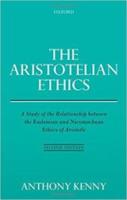
OUP (2nd ed., 2016) p/b 321pp £25 (ISBN 9780198790945)
In what we know as the Nicomachean Ethics (NE) Aristotle argues that the aim of politics is to achieve the maximum happiness for citizens. Every virtue is a mean, which lies between two extremes. Legislators endeavour to make citizens act well. Good constitutions achieve this more effectively than bad ones. The laws impose punishments as a form of cure for unacceptable behaviour. Aristotle discusses the nature of mind and the intellectual virtues at some length: while a young man may become expert at geometry or mathematics, he cannot be φρόνιμος. That, broadly, means possessing practical or political wisdom. Book 5 contains the famous discussion of corrective and distributive justice. The last part of NE comprises a review of happiness and the role of the state. Aristotle’s Eudemian Ethics (EE) covers much of the same ground as Nicomachean Ethics. There is lengthy discussion of happiness, virtues and wise judgment. Aristotle discusses in detail the difference between voluntary and involuntary actions. In book 3 he outlines his theory of justice. Traditionally people (including, it must be confessed, this reviewer) have regarded NE as the major work and EE as a lesser work, which the great man probably wrote earlier in his career.
In The Aristotelian Ethics K. turns that theory on its head. He argues that NE was written first and that EE came later. He advances some compelling arguments in support of that view. First, the Eudemian ideal of happiness as the exercise of all virtues is more mature than the Nichomachean idea that happiness is the exercise of intellectual virtue. Secondly, a major difference between the two works lies in their treatment of virtues: NE propounds seven major virtues and three minor ones; EE formulates six virtues and six ‘means of passion’. The Eudemian analysis of virtues appears to build upon and refine the Nichomachean analysis. Thirdly, the Nichomachean idea of happiness is closer to Plato’s teaching, which suggests that it was earlier in time. Fourthly, commentators in the ancient world gave primacy to EE. For example, Cicero appears to have treated EE as the authoritative statement of Aristotle’s position.
The impoverished manuscript tradition of EE has also played its part in the argument. Few manuscripts survived. None that we have is earlier than the thirteenth century and most are fifteenth century. There is much scope for corruption. The manuscript tradition of NE is distinctly better and allows less scope for corruption. This gives the false impression that NE is the more carefully considered, i.e. later, work.
K. also argues that books 5, 6 and 7 of NE in fact belong to EE. He bases this contention on an analysis of the cross-references, grammar and technical terms used in both books.
In later chapters, K. explores the Aristotelian concepts of wisdom and happiness. He compares the treatment of those two virtues in NE and EE. He also tackles the vexed question of dating. We know that Aristotle was born in 384 BC; that he studied at the Academy from 367 until Plato’s death in 347; and that thereafter he was tutoring future kings or teaching in Athens until his own death in 322. Beyond asserting that Aristotle wrote NE after 353 and before EE, K. cannot propose specific years for either work. The new final chapter is a response to critics of the first edition.
K.’s style of writing is clear and logical. Even so, this work is not light reading. It is not written for the general reader. A large swathe of humanity is not concerned about the order in which Aristotle wrote his ethical treatises. Such persons may safely resist the temptation to buy K.’s book. For any scholastic philosopher, however, or any classicist with a particular interest in Aristotle, this book has much to offer. I commend it to such readers.
Rupert Jackson
